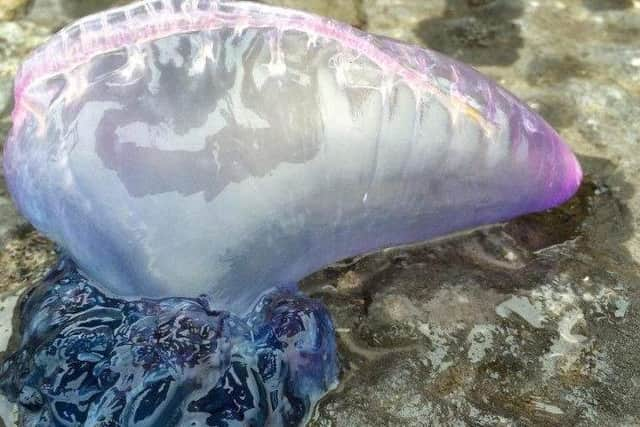Portuguese Man o' War spotted on Donegal beach
and live on Freeview channel 276
Dr. Donal Griffin from Fair Seas Ireland urged people to take care if they come across the jellyfish-like creatures which carry a very strong sting after one was sighted in Derrybeg, Gweedore.
The marine expert told the BBC: “You can see the gas-filled bladder, the colours are right, the tentacles, the way they drape down, are right.
Advertisement
Hide AdAdvertisement
Hide Ad“They can be quite exciting to see because they are that little bit more unusual, a little bit more exotic.
“And even when washed up on the beach, when they are dead or dying, their sting cells can still trigger”.
Dr. Griffin encouraged people to report sightings to the National Biodiversity Data Centre.
The sting of the animal - a siphonophore rather than a jellyfish - is very strong and can cause anaphylactic shock or seizures.
Advertisement
Hide AdAdvertisement
Hide Ad

Irish Water Safety have clear recommendations to follow if you come across the Portuguese Man o’ War.
They state you must ensure you don’t get stung yourself when aiding others; remove any attached tentacles with a gloved hand, stick or towel; do not rub the affected area, this may result in further venom release; rinse the affected area with sea-water (do not use fresh water, vinegar or urine) and apply a 'dry cold pack' to the area (i.e place a cold pack or ice inside a plastic bag and then wrap this package in a t-shirt or other piece of cloth).
The Health Service Executive warns: "A sting from the Portuguese Man o’ War (rarely seen in Irish waters) can cause symptoms such as muscle spasms, headaches, diarrhoea, difficulty breathing, heart rhythm problems and other symptoms. If in doubt seek medical attention."
The HSE suggests that is you are stung by the creatures use hot water at approximately 45° Celsius for 20 minutes.
Comment Guidelines
National World encourages reader discussion on our stories. User feedback, insights and back-and-forth exchanges add a rich layer of context to reporting. Please review our Community Guidelines before commenting.
